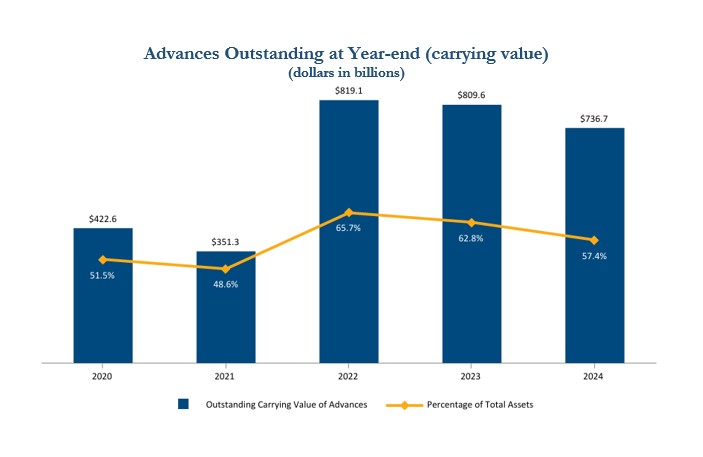Advances
The primary method for providing liquidity to members is through long-term and short-term loans called “advances.” An advance is a fully collateralized loan from an FHLBank to one of its members. Once a financial institution attains membership in a FHLBank, the member must purchase additional stock in the FHLBank in proportion to the amount of funds borrowed and must pledge collateral as security.
There are a variety of advance products, including: fixed-rate advances, variable-rate advances, hybrid-advances, convertible advances, amortizing advances, and overnight advances. Fixed rate advances typically make up more than half by product type and maturities range from overnight to 30 years. The FHLBanks cap the amount of advance credit available to each member at between 20 and 60 percent of the member’s total assets, with some exceptions available depending on member creditworthiness.
Under existing laws and regulations, all FHLBank members, regardless of size, have access to advances on equal terms based on criteria such as member credit quality and collateral, and FHLBank boards are prohibited from discriminating in favor of or against any specific members.
By law, members must pledge mission-related collateral and every advance must be fully collateralized. Acceptable collateral includes mortgages, mortgage-backed securities, loans and securities issued by the United States government, securities issued by any U.S. agency, cash or deposits at the FHLBank, and other collateral that is real estate related. Community financial institution members may also pledge small business loans, small farm loans, small agribusiness loans, and community development loans as collateral.

When a member pledges collateral to an FHLBank, the FHLBank estimates the cost of selling or liquidating the collateral and the risk of decline in the asset’s value due to market or credit volatility. This cost is incorporated as a collateral discount, or “haircut,” ultimately resulting in the lending value of the collateral exceeding the amount owed to the FHLBank.
The FHLBanks have never suffered a loss on a collateralized advance to a member, and they retain priority lien and substantial collateral against advances.
